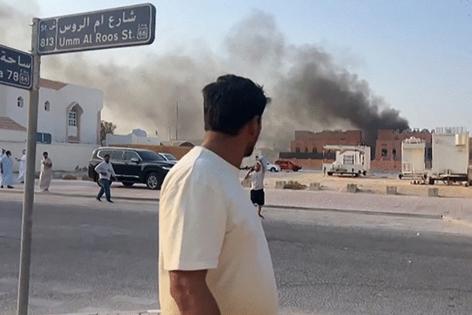Israel targets Hamas leadership in strikes on Qatari capital
Published in News & Features
JERUSALEM — Israel conducted an unprecedented strike against senior Hamas leaders in the Qatari capital of Doha, escalating an already tense standoff between the country and Arab nations over the war in Gaza.
The move against the Iran-backed group was “a wholly independent Israeli operation,” Prime Minister Benjamin Netanyahu’s office said in a statement on Tuesday, suggesting the U.S. — a close ally of both Israel and Qatar — had no direct involvement. “Israel initiated it, Israel conducted it, and Israel takes full responsibility.”
A White House official, who requested anonymity to discuss the operation, said Israel notified President Donald Trump’s administration immediately before the attack took place.
Qatar condemned the strike, calling it a “flagrant violation” of international law, after several blasts were heard earlier in Doha. Qatar “will not tolerate this reckless Israeli behavior and its continued tampering with regional security,” Foreign Ministry Spokesman Majed Al Ansari said in a post on X.
Hamas leaders, headed by Khalil Al-Hayya, survived the Israeli attack, Doha-based Al Jazeera reported, citing a senior Hamas source. There’s been no official confirmation on whether they are alive.
Israel has been fighting Hamas in Gaza since the militant group’s deadly attack on the country in October 2023. Qatar is one of the key mediators between Israel and the Palestinian group, designated a terrorist organization by the U.S. and European Union, and has been central to on-off ceasefire talks between the two sides.
Those negotiations — co-mediated by Egypt — haven’t notably advanced since Hamas said in mid-August it had agreed to a proposal to release half of the hostages it still holds from the Oct. 7 attack in exchange for a partial withdrawal of Israeli troops. Israel, which has demanded Hamas fully disarm, has since initiated plans to take over Gaza City, and this week ordered its 1 million residents to leave ahead of a major military offensive.
“Israel’s targeting of Hamas leadership in Qatar ends the prospects of a ceasefire deal in Gaza, will unnerve Doha and other Arab Gulf states, and further erode the perception of the U.S. as a reliable security partner,” Dina Esfandiary and Ziad Daoud, of Bloomberg Economics, wrote in a note. “It’s a significant escalation of tensions.”
Stoking Anger
Israel has never previously attacked Qatar, and the strike is likely to further anger Arab nations already on edge about the Palestinian deathtoll in Gaza and the humanitarian impact of the war. Israel’s campaign has devastated Gaza, and a United Nations body declared a famine in parts of the territory due to blocks on food aid.
The Israeli attack on Qatar may prove awkward for Trump, who has so far supported Israel’s military actions against Hamas and other Tehran-backed militant groups. He also backed Israeli airstrikes on Iran itself three months ago.
Qatar is home to Al-Udeid Air Base, the biggest U.S. military installation in the Middle East, and Trump visited the country in May. The QIA, the nation’s sovereign wealth fund, is a major investor in the U.S. and — as part of Trump’s trip — pledged to invest hundreds of billions of dollars more in the near future.
“Qatar now faces a difficult balancing act as it seeks to strike the right response,” said Torbjorn Soltvedt, an analyst at risk intelligence company Verisk Maplecroft. “After investing considerable time and diplomatic effort into strengthening ties with Washington, Qatar’s political leadership is acutely aware of the potential repercussions of any actions that could jeopardize relations with Washington.”
Oil jumped after reports of the Israeli attack, which revived fears of a wider conflict in the Middle East. West Texas Intermediate climbed 2.3% to top $63 a barrel before paring gains.
United Arab Emirates Foreign Minister Sheikh Abdullah bin Zayed Al Nahyan warned that such “reckless attacks” will have “extremely dangerous repercussions” for regional and international security. The UAE was one of the countries that established diplomatic ties with Israel as part of the U.S.-brokered Abraham Accords in 2020, a key part of Trump’s foreign-policy agenda.
Saudi Arabia’s Crown Prince Mohammed Bin Salman, another Trump ally, called the Israeli attack a “criminal act” and “flagrant violation” of international laws, according to the state-run Saudi Press Agency. The strikes were also criticized by Turkey, Iran and Kuwait, which called it a “serious threat” to regional security.
Israel was believed to be behind the assassination of then-Hamas leader Ismail Haniyeh in Tehran in July 2024. Other attacks on different countries include last year’s offensive against Lebanon-based Hezbollah, another Iran-backed militant group, and in Syria.
---------
—With assistance from Dan Williams, Fiona MacDonald and Abeer Abu Omar.
©2025 Bloomberg L.P. Visit bloomberg.com. Distributed by Tribune Content Agency, LLC.







Comments